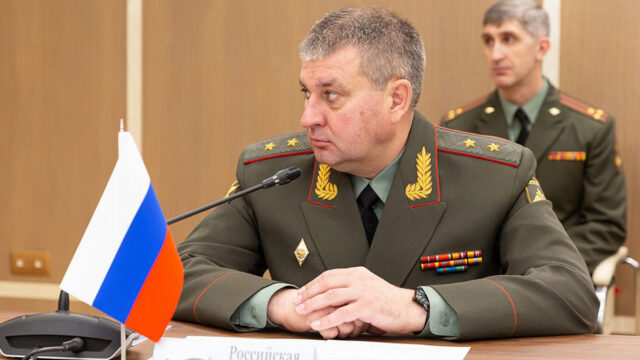
Russian Ministry of Defense Conducts ‘Great Purge’
Publication: Eurasia Daily Monitor Volume: 21 Issue: 80
By:

Executive Summary:
-
The Russian Ministry of Defense (MoD) is currently purging numerous military officers and MoD officials in an alleged “anti-corruption” campaign.
-
The political motivation for these attacks is unclear, though this could be an effort to find scapegoats responsible for Russia’s troubles in the war against Ukraine.
-
Public officials, military leaders, and top managers of state-owned factories and corporations in Russia must violate laws to execute their daily responsibilities, and deciding who is to be punished for these violations is almost always political.
On May 23, Lieutenant General Vadim Shamarin, chief of the Main Directorate for Communications and deputy chief of the Russian General Staff, was arrested. The arrest happened just two days after the apprehension of Major General Ivan Popov, former commander of the 58th Combined Army, who fell out of favor after a conflict with Army General Valery Gerasimov in 2023. The arrests of these two generals are a continuation of the so-called “anti-corruption” line, a tactic chosen by the Russian Investigative Committee and Federal Security Service (FSB), whose participation is inevitable in such criminal cases. Shamarin has been accused of bribery, and Popov is charged with fraud related to metal construction. For comparison, former Deputy Minister of Defense Timur Ivanov and ex-chief of the Main Directorate for Personnel Lieutenant General Yuri Kuznetsov, who was arrested earlier, has been accused of bribery (see EDM April 24, May 20). Vladimir Verteletsky, an officer of the Ministry of Defense’s (MoD) department for arms procurement, was recently detained and accused of abuse of power. It is unclear whether all these activities are related to the dismissal of Major General Sukhrab Akhmedov, commander of the 20th Combined Army, which became publicly known on May 23 (RBC, April 24, May 23 [1], [2]; Vedomosti, May 16; Vedomosti, May 21; Kommersant, May 23). This purge, along with economist Andrei Belousov’s appointment as Defense Minister, points to Moscow likely preparing for the “long war” and new military projects, in which it must ensure complete loyalty from officials (see EDM, May 22).
The main challenge of this anti-corruption campaign in the Russian MoD is that the purges are in fact unrelated to corruption (see EDM, May 16, 20, 22). Within the Russian political-economic system, any contract related to procurements, research and development, or construction is impossible without violations of contradictory laws and regulations and the interests of other agencies and/or competing powerful actors. Public officials, military, and top managers of state-owned factories and corporations in Russia must violate laws to execute their daily responsibilities. As a result, deciding who would be punished for these violations is always political, as every official has had to violate laws in one way or another. Today, the Kremlin and the FSB are attacking Russian military leadership.
The political motivation for these attacks, which promises to paralyze the MoD’s work in many areas, is unclear. Besides the evident efforts toward auditing and optimizing arms procurements and recruiting, the purges could be an effort to find scapegoats responsible for Russia’s troubles in the war against Ukraine (see EDM, May 16). Alternatively they could reflect tougher measures to maintain the generals’ loyalty and break their resistance. The Kremlin must soon decide what to do next on the battlefield in Ukraine and what to do with its wider confrontation against the North Atlantic Treaty Organization (NATO), in which there are only risky and painful options, including the potential of nuclear warfare (see EDM, May 23). Belousov demonstrates his mandate for the ongoing purge among the military leadership and is playing the role of “bad cop,” while Putin tries to play the role of “good cop” (Kremlin.ru, May 15).
The criminal case against Shamarin demonstrates how an anti-corruption campaign in RUssia works. He is accused of receiving 36 million rubles (about $400,000) as a bribe from the managers of the telephone plant Telta in Perm in exchange for patronage and contracts. Two major problems, however, accompany this accusation. First, the top managers of Telta have been under arrest since July 2023 and were accused of fraud, likely related to the use of Chinese-made components in devices supplied to the MoD. Second, Telta itself is not able to produce modern communication devices without imported components and exists as a relatively small final assembly facility on the territory of a former Soviet-era telephone plant, most of which is rented out (Kommersant, July 25, 2023; Gazeta.ru, May 23; Web.archive.org, accessed May 23).
The Shamarin case is similar to the criminal accusation of his predecessor, Colonel General Khalil Arslanov, who was accused of stealing several billion rubles through the procurement of military radio communication sets in China (Kommersant, March 4, 2021). Similar cases are common for many other contracts and entities in Russia. Belousov cannot change the Russian military’s poor performance and hardly pretends to be able to do so. He must, however, maintain the absolute loyalty of the Russian generals to the Kremlin’s way of war to stay in power and accomplish the tasks set before him. The anti-corruption purge is merely a tool for the Kremlin to stoke fear in its underlings, ensure ultimate loyalty through the looming threat of arrest, and deflect blame for the disastrous war against Ukraine.



